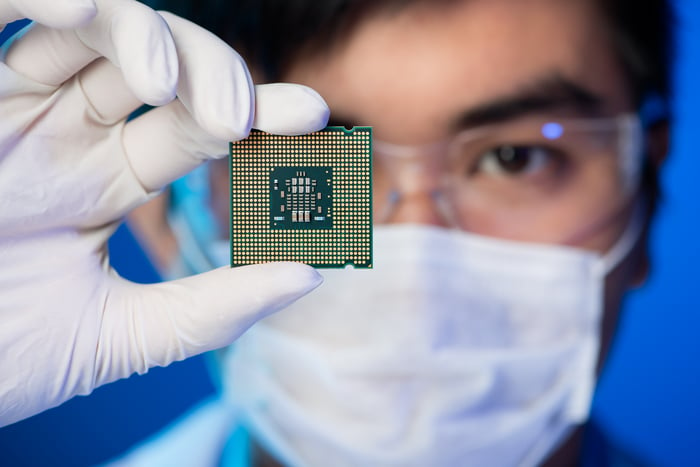Broadcom ( AVGO -0.48%) has emerged as a major winner in the surge of demand for artificial intelligence (AI) chips, following Nvidia. This is largely due to Broadcom’s application-specific integrated circuits (ASICs), which have become highly popular among cloud service providers seeking more affordable options compared to Nvidia’s costly graphics cards.
It’s no surprise that there are reports of Nvidia launching a new division dedicated to ASICs. These custom chips can be tailored for particular functions, making them increasingly attractive for AI inference workloads.
The significant efficiency advantage that ASICs offer over graphics processing units (GPUs) for specialized tasks is driving their popularity—and other companies in the sector are also reaping the benefits.

Image source: Getty Images.
A smaller competitor to Broadcom is making strides in the profitable custom AI chip sector
Broadcom projects that its serviceable addressable market (SAM) from just three hyperscale clients using its custom AI chips could reach between $60 billion and $90 billion in the next few years. This number could climb even higher as Broadcom continues to add new customers.
However, Broadcom isn’t the only player aiming to capitalize on this opportunity. Nvidia appears to be eyeing this segment as well. But it’s important to highlight that a smaller rival is quickly gaining momentum in the custom AI chip market and could pose a challenge to Broadcom’s leadership.
That competitor is Marvell Technology ( MRVL -0.73%). While Broadcom reportedly holds a dominant 70% share of the custom AI chip market, Marvell is rapidly closing the gap. The company is aiming for a 20% market share by 2028, up from under 5% in 2023. Previously, Marvell estimated its potential revenue in this area could reach $55 billion by 2028, so a 20% share would translate to $11 billion in custom AI chip sales.
This would mark a significant jump from the $4 billion in AI revenue Marvell is forecasted to achieve this fiscal year. Still, it wouldn’t be surprising if Marvell’s AI revenue surpasses $11 billion in three years, as it is well-positioned to capture more market share from Broadcom and expand its addressable market.
During its most recent earnings call, Marvell’s management stated that they expect to secure 20% of an updated $94 billion total addressable market (TAM) by 2028. With $7.2 billion in total revenue over the last four quarters, the custom AI chip segment alone could dramatically accelerate Marvell’s growth.
Moreover, Marvell could potentially outpace its current projections by taking even more share from Broadcom in the coming three years. The company now sees over 50 custom AI chip opportunities across more than 10 clients, which could generate as much as $75 billion in lifetime revenue. Marvell is already designing chips for three leading cloud service providers, and its growing pipeline indicates a likely expansion of its customer base.
Marvell’s valuation and stronger growth outlook make it a more attractive choice than Broadcom
Marvell’s growth rate is outpacing Broadcom’s. In the last quarter, Marvell’s revenue soared 58% year over year to $2 billion, while Broadcom’s revenue climbed 22% to $16 billion. Marvell’s earnings more than doubled, compared to Broadcom’s 36% rise in non-GAAP earnings per share.
While Marvell is the smaller of the two companies, this gives it more room to expand quickly and challenge Broadcom’s dominance. Additionally, Marvell is much more affordable, trading at a forward earnings multiple of 27 versus Broadcom’s 37. These factors make Marvell a compelling AI stock to consider now, as it has the potential to deliver substantial long-term returns by capturing a larger share of the lucrative custom AI chip market.

